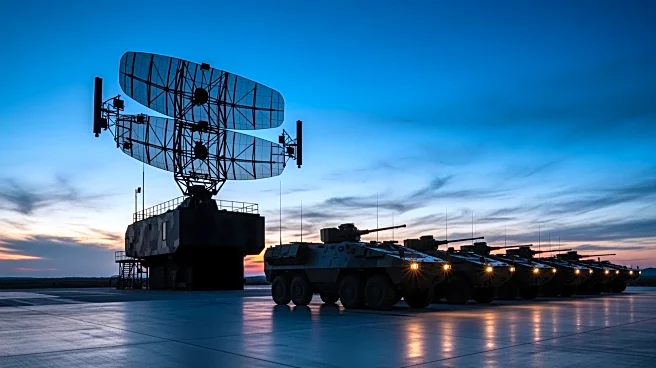What's Happening?
Germany is taking significant steps to bolster its military capabilities in response to the perceived threat from Russia. Chancellor Friedrich Merz has committed to transforming the Bundeswehr, Germany's armed forces, with plans to increase troop numbers
and military spending. This initiative is part of a broader European strategy to prepare for potential conflict with Russia by the end of the decade. Defense strategist Nicholas Drummond has highlighted the importance of Germany's role in reshaping Europe's security landscape, noting that a future conflict with Russia would likely be fast-paced and involve significant air power. The European Union's Defense Readiness 2030 plan underscores the urgency of these preparations, as concerns grow over Russia's intentions following its actions in Ukraine.
Why It's Important?
Germany's military expansion is crucial for the security of Europe, particularly in light of Russia's aggressive posture. By increasing its defense budget and troop numbers, Germany aims to become a key player in NATO's defense strategy against potential Russian aggression. This move is expected to enhance Germany's ability to contribute significantly to collective security efforts, providing a counterbalance to Russia's military capabilities. The initiative also reflects a shift in European defense priorities, with Germany taking on a leadership role in ensuring regional stability. The potential involvement of other countries, such as China, North Korea, and Iran, in supporting Russia adds complexity to the geopolitical landscape, making Germany's actions even more critical.
What's Next?
Germany is set to increase its defense spending to 153 billion euros annually by 2029, making it one of the top global military spenders. The Bundeswehr's ranks are expected to grow significantly, with new legislation requiring 18-year-old men to undergo assessments for military service starting in 2026. This expansion will focus on artillery, munitions, cruise missiles, and air defense systems. As Germany strengthens its military capabilities, it will play a pivotal role in NATO's defense plans, potentially leading a coalition of European countries in countering Russian threats. The success of these efforts will depend on Germany's ability to recruit and retain personnel, procure necessary equipment, and develop infrastructure to support its expanded military role.
Beyond the Headlines
Germany's military expansion has broader implications for European unity and defense collaboration. As Germany takes on a more prominent role in NATO, it may influence the strategic direction of the alliance, encouraging other member states to increase their defense commitments. This shift could lead to a more cohesive and robust European defense posture, enhancing the continent's ability to respond to external threats. Additionally, Germany's actions may prompt discussions on the balance between national sovereignty and collective security within the EU, as countries navigate the complexities of shared defense responsibilities.















